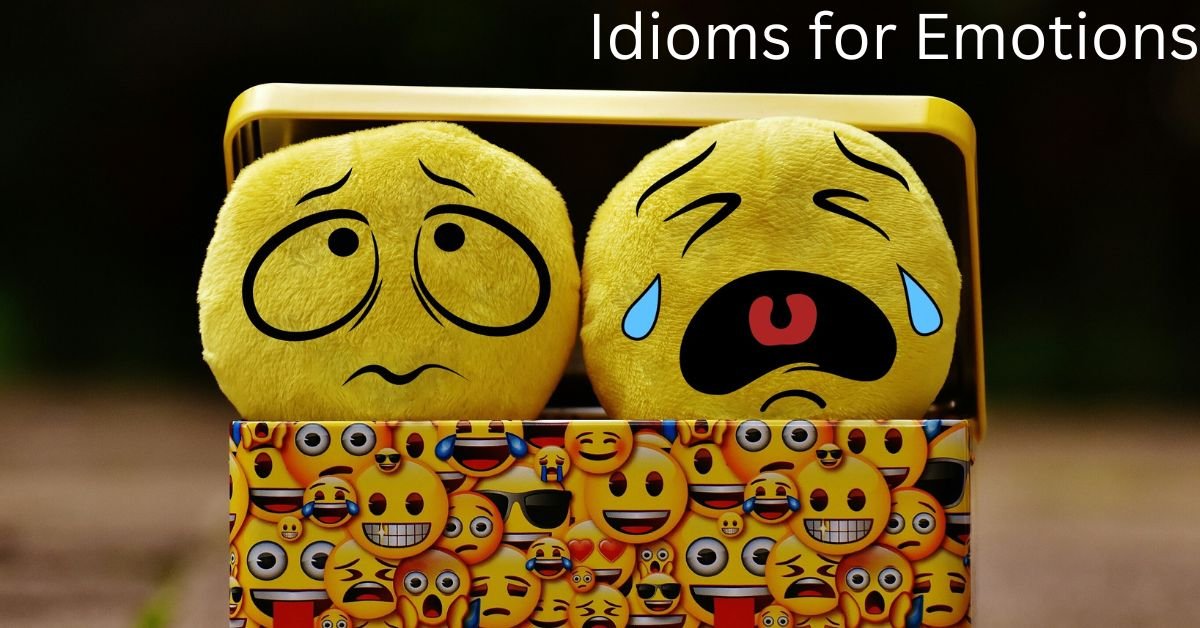Idioms for Emotions
The English language offers a rich tapestry of expressions that go beyond literal meaning. Idioms for emotions are a powerful tool in this regard, allowing us to convey a vast spectrum of feelings with precision and imagery. Mastering these idioms for emotions adds depth and nuance to your communication, enabling you to express yourself in a way that’s both colorful and impactful.
Understanding and using idioms for emotions effectively elevates your ability to connect with others. Imagine describing someone being ecstatic as simply “happy.” Now, compare that to saying they’re “over the moon” – the imagery instantly evokes a stronger sense of joy. Similarly, instead of stating someone is angry, you could say they’re “furious” or “seething with rage,” conveying a more intense level of anger. Exploring and incorporating these idioms for emotions will transform your communication from basic to expressive, fostering a stronger emotional connection with your audience.
Happiness & Excitement:
- Over the moon: Extremely happy (ex: “She was over the moon about getting the promotion.”)
- On cloud nine: Feeling euphoric (ex: “He felt like he was on cloud nine after winning the competition.”)
- Jumping for joy: Wildly happy (ex: “The children were jumping for joy at the sight of the Christmas presents.”)
- In seventh heaven: Extremely happy (ex: “They were in seventh heaven after reuniting after years apart.”)
- Grin from ear to ear: A wide, happy smile (ex: “The child grinned from ear to ear as he opened his birthday gift.”)

Sadness & Regret:
- Down in the dumps: Feeling low or depressed (ex: “She’s been feeling down in the dumps since her pet passed away.”)
- Hit rock bottom: Reach the lowest point (ex: “After losing his job, he felt like he’d hit rock bottom.”)
- Bring tears to your eyes: To evoke sadness (ex: “The war documentary brought tears to her eyes.”)
- A broken heart: Deep sadness from heartbreak (ex: “She was left with a broken heart after their unexpected breakup.”)
- Long face: A sad expression (ex: “He walked in with a long face after the bad news.”)

Anger & Frustration:
- Seething with rage: Intensely angry but controlled (ex: “He was seething with rage after the unfair treatment.”)
- Furious: Extremely angry (ex: “The customer was furious after waiting for hours on hold.”)
- At your wit’s end: Extremely frustrated and unable to cope (ex: “After dealing with all the problems, she was at her wit’s end.”)
- Steam coming out of your ears: Extremely angry (ex: “The manager was practically steaming coming out of his ears after the customer’s outburst.”)
- Up in arms: Angrily protesting (ex: “The community was up in arms about the proposed construction project.”)

Fear & Anxiety:
- On edge: Feeling nervous or anxious (ex: “She was on edge all day waiting for the test results.”)
- Scared stiff: Extremely frightened (ex: “The children were scared stiff when they saw the thunderstorm approaching.”)
- White-knuckled: Tense and nervous (ex: “He gripped the steering wheel white-knuckled during the car chase scene in the movie.”)
- Butterflies in your stomach: Feeling nervous or anxious (ex: “She had butterflies in her stomach before her first job interview.”)
- Petrified: Extremely frightened (ex: “The hikers were petrified when they came face-to-face with a bear.”)
Love & Affection:
- Head over heels: Deeply in love (ex: “He was head over heels for his new girlfriend.”)
- Can’t take your eyes off someone: Be captivated by someone’s beauty (ex: “He couldn’t take his eyes off her the entire night.”)
- Swept off your feet: Completely charmed and captivated (ex: “She was swept off her feet by his romantic gesture.”)
- Butterflies in your stomach (can also be used for nervousness): Feeling excited and giddy in the presence of someone you love (ex: “He always gets butterflies whenever he sees his crush.”)
- Warm and fuzzy feeling: A feeling of comfort and happiness (ex: “Spending time with her family gave him a warm and fuzzy feeling.”)
Surprise & Confusion:
- Speechless: Unable to speak due to surprise (ex: “She was speechless when she won the lottery.”)
- Out of the blue: Unexpected (ex: “The news of his promotion came completely out of the blue.”)
- Lost for words: Unable to speak due to surprise or confusion (ex: “He was lost for words after he witnessed the car accident.”)
- Double take: A surprised look that causes someone to look again (ex: “She did a double take when she saw her old friend walking down the street.”)
- In a fog: Confused and disoriented (ex: “He felt in a fog after being hit on the head during the game.”)
Conclusion
The English language offers a treasure chest of expressions waiting to be discovered. Idioms for emotions are gems within this chest, allowing you to express a kaleidoscope of feelings with vividness and precision. Whether you want to convey the bubbling joy of being “over the moon” or the crushing weight of being “down in the dumps,” idioms provide the perfect tool.
Mastering idioms for emotions goes beyond simply using them correctly. It’s about understanding the cultural context and imagery that imbue them with meaning. Explore the origin stories behind these expressions, and you’ll unlock their true power to paint a picture with words. As you become fluent in the language of idioms, you’ll find yourself expressing your emotions with a richness and depth that will resonate with your audience. Remember, the more you explore idioms for emotions, the more you’ll expand your emotional vocabulary and elevate your communication skills.
I have also written post on idioms about relationships, idioms about love, idioms about friendships, and idioms about education. Click the link and rea din detail.










I am genuinely amazed with your deep insights and excellent ability to convey information. The knowledge you share clearly stands out in every sentence. It’s clear that you spend considerable time into delving into your topics, and that effort is well-appreciated. Thanks for providing this valuable knowledge. Keep up the great work!
I’m thoroughly captivated by the deep insights and superb ability to convey information. Your depth of knowledge is evident in every piece you write. It’s evident that you put a lot of effort into researching your topics, and this effort pays off. We appreciate your efforts in sharing such detailed information. Continue the excellent job!
I am genuinely amazed by the keen analysis and excellent writing style. Your expertise is evident in every sentence. It’s clear that you invest a great deal of effort into researching your topics, and this effort does not go unnoticed. We appreciate your efforts in sharing such detailed information. Keep on enlightening us!
I am genuinely amazed with your profound understanding and excellent ability to convey information. Your expertise is evident in every piece you write. It’s evident that you invest a great deal of effort into delving into your topics, and this effort pays off. Thank you for sharing such detailed information. Keep up the great work!
I’m truly impressed by your profound understanding and excellent way of expressing complex ideas. Your depth of knowledge clearly stands out in every piece you write. It’s obvious that you put a lot of effort into understanding your topics, and the results pays off. Thanks for providing this valuable knowledge. Continue the excellent job!
Hello.This article was really fascinating, especially because I was looking for thoughts on this subject last Wednesday.
some genuinely superb information, Glad I discovered this.
Hmm is anyone else having problems with the images on this blog loading? I’m trying to determine if its a problem on my end or if it’s the blog. Any feedback would be greatly appreciated.
One thing I’ve noticed is there are plenty of beliefs regarding the banking institutions intentions while talking about home foreclosure. One myth in particular is the bank would like your house. The bank wants your cash, not the home. They want the amount of money they lent you with interest. Preventing the bank will still only draw a foreclosed realization. Thanks for your write-up.
Hi there would you mind stating which blog platform you’re using? I’m going to start my own blog soon but I’m having a difficult time selecting between BlogEngine/Wordpress/B2evolution and Drupal. The reason I ask is because your layout seems different then most blogs and I’m looking for something unique. P.S Sorry for being off-topic but I had to ask!
Thank you for every other informative site. Where else may I get that kind of info written in such an ideal approach? I’ve a mission that I’m just now operating on, and I’ve been on the look out for such info.
Would you be considering exchanging links?
Does your website have a contact page? I’m having problems locating it but, I’d like to shoot you an e-mail. I’ve got some suggestions for your blog you might be interested in hearing. Either way, great website and I look forward to seeing it expand over time.
Thanks for your blog post.
Hey There. I discovered your blog the use of msn. This is a really well written article. I’ll make sure to bookmark it and come back to read extra of your useful information. Thank you for the post. I’ll definitely comeback.
It’s appropriate time to make some plans for the future and it’s time to be happy. I have read this post and if I could I wish to suggest you few interesting things or suggestions. Maybe you can write next articles referring to this article. I desire to read more things about it!
Can I just say what a relief to find someone who actually knows what theyre talking about on the internet. You definitely know how to bring an issue to light and make it important. More people need to read this and understand this side of the story. I cant believe youre not more popular because you definitely have the gift.
You are my breathing in, I possess few web logs and infrequently run out from to brand.
I’ve recently started a web site, the info you offer on this web site has helped me tremendously. Thank you for all of your time & work. “Marriage love, honor, and negotiate.” by Joe Moore.
Keep functioning ,terrific job!
Pretty section of content. I just stumbled upon your blog and in accession capital to assert that I get in fact enjoyed account your blog posts. Anyway I will be subscribing to your feeds and even I achievement you access consistently fast.
Hello.This post was extremely motivating, particularly because I was searching for thoughts on this subject last Monday.
some truly marvellous work on behalf of the owner of this site, utterly outstanding subject material.
you have brought up a very fantastic points, thanks for the post.
I’ve been exploring for a little bit for any high-quality articles or blog posts on this kind of area . Exploring in Yahoo I at last stumbled upon this web site. Reading this info So i am happy to convey that I have an incredibly good uncanny feeling I discovered just what I needed. I most certainly will make sure to do not forget this website and give it a glance regularly.
Precisely what I was looking for, thanks for putting up.
I am impressed with this web site, really I am a big fan .
I appreciate you and admire your appreciation. Keep it up.
Hey very interesting blog!
Your method of describing the whole thing in this post is actually fastidious, all can effortlessly know it, Thanks a lot.
What excellent words